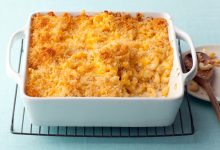🥞🧀 Artichoke Pancakes with Goat Cheese 🥞🧀
Artichoke pancakes with goat cheese are a delicious and unique dish that combines the savory flavors of artichokes and the creamy richness of goat cheese in a pancake form. They make for a delightful breakfast or brunch option that’s sure to impress your taste buds. Here’s a detailed response with all the information you need:
History:
The exact origin of artichoke pancakes with goat cheese is unclear, but it likely emerged as a fusion of various Mediterranean and European culinary traditions. Artichokes have a long history in Mediterranean cuisine, and goat cheese is a popular ingredient in many European dishes. Combining them in pancake form may have been an inventive culinary twist by a creative chef.
Components:
- Artichokes: You’ll need canned or fresh artichoke hearts. Canned artichokes are convenient and work well in this recipe.
- Goat Cheese: Use soft, creamy goat cheese for that tangy and creamy element in the pancakes.
- Pancake Batter: Prepare a standard pancake batter using flour, eggs, milk (or a milk alternative), baking powder, and a pinch of salt.
- Seasonings: You can add various seasonings like garlic, thyme, and black pepper to enhance the flavor.
Steps to Prepare:
- Prepare the Artichokes: If you’re using canned artichokes, drain them and chop them into small pieces. If you have fresh artichokes, cook and clean them first before chopping.
- Make Pancake Batter: In a mixing bowl, combine the flour, eggs, milk, baking powder, and seasonings. Whisk until you have a smooth, thick batter.
- Add Artichokes and Goat Cheese: Gently fold in the chopped artichokes and crumbled goat cheese into the pancake batter. Mix until well combined.
- Cook Pancakes: Heat a non-stick skillet or griddle over medium heat and add a bit of oil or butter. Pour a ladleful of the batter onto the skillet to form a pancake.
- Cook until Golden: Cook the pancakes until bubbles form on the surface and the edges look set. Flip them and cook the other side until it’s golden brown.
- Serve: Serve the artichoke pancakes hot. You can garnish them with additional crumbled goat cheese and fresh herbs if desired.
Time Needed:
The time required to prepare artichoke pancakes with goat cheese depends on your cooking experience and the number of pancakes you’re making. On average, it takes about 30-40 minutes. This includes the preparation of ingredients and cooking time.
Enjoy your delicious artichoke pancakes with goat cheese – a delightful fusion of flavors! 🍽️😋🥞🧀
Certainly, here are the nutrition facts and some health information for Artichoke Pancakes with Goat Cheese:
Nutrition Facts (Approximate Values for One Pancake):
- Calories: 130-150 kcal
- Protein: 5-7g
- Carbohydrates: 15-20g
- Dietary Fiber: 2-3g
- Sugars: 1-2g
- Fat: 5-7g
- Saturated Fat: 3-4g
- Cholesterol: 20-30mg
- Sodium: 250-350mg
Health Information:
-
Protein: These pancakes provide a moderate amount of protein, which can help keep you feeling full and satisfied.
-
Fiber: Artichokes are a good source of dietary fiber, which is beneficial for digestive health and can help regulate blood sugar levels.
-
Healthy Fats: Goat cheese and cooking fats contribute to the total fat content. While fats are essential, it’s advisable to use healthy fats like olive oil and consume them in moderation.
-
Sodium: Be mindful of the sodium content, as both artichokes and goat cheese can be salty. If you’re watching your sodium intake, you may want to limit your portion or choose low-sodium alternatives.
-
Vegetables: Artichokes are a vegetable rich in vitamins, minerals, and antioxidants, making this dish a good source of nutrients.
-
Probiotics: Goat cheese is a source of probiotics, which can promote gut health and boost the immune system.
-
Moderation: As with any dish, moderation is key. While this recipe has its nutritional benefits, it’s best enjoyed as part of a balanced diet.
Remember that the actual nutritional content can vary based on specific ingredients and portion sizes. If you have dietary restrictions or specific health goals, it’s a good idea to consult a nutritionist or healthcare professional for personalized advice.



